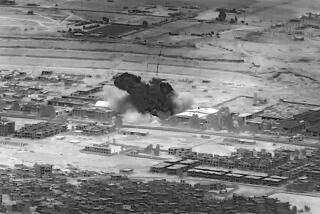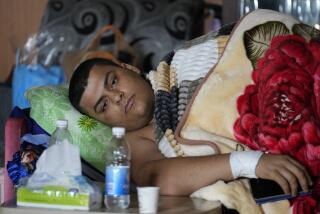2 Iraq bombings kill more than 50
- Share via
BAGHDAD — Bombs in two provincial capitals killed more than 50 Iraqi civilians Tuesday, underscoring the continuing threat posed by Sunni Muslim insurgents as they try to regain power in former strongholds.
Coinciding with military efforts to curb the strength of Shiite Muslim militias in Baghdad and southern Iraq, the new attacks also portend the hurdles the Iraqi government may face as U.S. troop levels decrease through the summer. Iraqi troops will take on more responsibility for holding on to security gains made in the last year, and the challenge will be formidable if both Sunni and Shiite extremists are active.
The latest attacks occurred in Baqubah, the capital of Diyala province northeast of Baghdad, and Ramadi, the capital of Anbar province in western Iraq. Both were characteristic of the militant group Al Qaeda in Iraq, which has targeted public places with suicide attackers and car bombs to inflict widespread damage and casualties. Last month, there were 60 such attacks across Iraq, according to U.S. military figures. That represented an increase from 45 in February and 43 in January, the figures showed.
Attacks occur far less frequently than a year ago, before an additional 28,500 U.S. troops were sent to Iraq, but the steady increase of late appears to be a sign of the Sunni militant group’s tenacity, an American military official said. As long as it is able to lure foreign fighters into Iraq with promises of financial rewards, and as long as Iraq’s borders remain porous, Al Qaeda in Iraq will remain a threat, the official said. He spoke on condition of anonymity because he was speculating on security issues.
“Their strength is they can buy the talent they need,” he said. “They’ve got a great deal of resilience.”
At least 14 suicide bombings or car bomb attacks have been carried out this month, in addition to the incidents Tuesday and a bombing Monday near the Syrian border that killed 14 Iraqi soldiers.
U.S. military officials condemned the latest violence but said it should not be viewed as a sign that Sunni insurgents have regained the strength they had lost in the last year.
“This is the first suicide attack inside Baqubah in almost 90 days, and the overall violence in the city has decreased by 80% since June,” said Maj. Mike Garcia, a spokesman for U.S. forces in Diyala province. Ramadi also has seen violence plummet from an average of hundreds of attacks a day in early 2007, to about two a day now, according to the military.
But Iraqi and U.S. officials, as well as independent analysts, have warned that there is the potential for a continued uptick in violence by both Sunni and Shiite militants who aim to drive U.S. forces out of Iraq.
One high-ranking Iraqi government official predicted “a few more rude awakenings” by Shiite militias and by Al Qaeda in Iraq through the summer.
“Al Qaeda command is eyeing the American elections,” the official said. “Therefore, we must anticipate they will do everything in their power to mount spectacular attacks and increase the level of violence to tell Americans that Iraq is not worth it.”
Tuesday’s bombings targeted commercial areas guaranteed to be crowded with people.
In Baqubah, a car parked along a busy downtown street exploded about 11:30 a.m., shattering storefronts, setting vehicles ablaze and sending chunks of debris flying. The street is lined with government buildings, including a post office and courthouse.
Police said at least 40 people died and 70 were wounded.
The charred bodies of victims lay on white sheets outside a Baqubah hospital, yet to be identified. Men and women wept over corpses of friends and relatives they recognized.
In Ramadi, the attacker rode a motorcycle up to a restaurant, walked inside and blew himself up. Police said 13 people, including seven police officers eating lunch, were killed.
Fifteen people were wounded and several of them were not expected to survive because of the seriousness of their injuries, said Dr. Imad Ani at Ramadi General Hospital.
In Mosul, two bombs wounded three Iraqi police officers and 15 civilians, U.S. military officials said. Both blasts targeted the same spot, with the second one going off minutes after the first as people rushed to the scene to help the wounded.
At least four people died when a bomb went off in central Baghdad.
The decreased violence in Sunni strongholds has been due in part to the decision by many Sunni Arab leaders to turn against the insurgents. This led to the recruitment of tens of thousands of mainly Sunni volunteers who bolster security in the former insurgent areas.
But these volunteers, known collectively as the Sons of Iraq or concerned local citizens, have been targeted repeatedly by insurgents using suicide bombers to attack their checkpoints. These attacks have been particularly prevalent in Baqubah despite two major U.S. offensives aimed at driving insurgents from the city.
The first operation, in June, reduced violence and ended Al Qaeda in Iraq’s control of the city, which insurgents in 2006 had chosen as the capital of their self-proclaimed caliphate. Rather than quashing the insurgency, the offensive pushed the militants to the outskirts of the city. In January, the U.S. and Iraqi militaries staged another offensive, but they have acknowledged that many fighters simply moved farther north into Nineveh and Salahuddin provinces.
Now that attention has focused on those northern areas, insurgents may be migrating back, said Diyala’s governor, Raad Rashid Jawad. He said an Iraqi military offensive launched in Mosul, the capital of Nineveh, “may force some Qaeda elements to infiltrate Baqubah, but we took the appropriate security measures to try to overcome this.”
A leader of the Sons of Iraq in Diyala, Abu Mustafa, agreed that insurgents who had scattered during the June and January offensives were “making attempts to prove their presence.”
He described the attacks as “nothing but muscle flexing” by insurgents desperate to reclaim territory but also warned that unless U.S. and Iraqi forces gave more help to the security volunteers, the situation could deteriorate.
“The Americans helped in the beginning. However, they are leaving us now in the middle of the road,” he said, an apparent reference to U.S. troop reductions and to the Americans’ stated intentions to pass responsibility for the Sons of Iraq program to the Iraqi government.
Each volunteer gets about $10 a day, but with more than 90,000 of them on the U.S. military payroll, the Americans have warned that the program cannot last forever. They have said that Iraq’s government has promised to set up job training programs for volunteers who cannot be absorbed into the regular security forces. Many members of the Sons of Iraq, however, suspect that the Shiite-led government has no intention of taking care of the overwhelmingly Sunni volunteer forces.
Resentment toward the Iraqi government is particularly strong in Diyala, where members of the Sons of Iraq have staged walkouts in recent months to demand the ouster of a Shiite provincial police chief whom they accuse of sectarian bias. The government has refused to fire the police chief, and U.S. officials have voiced support for him.
“The lack of American and [Iraqi] government support has created frustration on our end, and I would say with confidence that if they keep not cooperating with the [volunteers], then it’s possible that cells of Qaeda might return strongly to Diyala,” Abu Mustafa said.
Holding on to security gains is crucial if the United States is to carry out projected transfers of security control to Iraqis.
In his testimony to Washington lawmakers this month, the commander of U.S. forces in Iraq, Army Gen. David H. Petraeus, presented charts showing the projected transfer of Anbar was June. Diyala province is projected to be transferred by December.
Times staff writer Ned Parker in Baghdad and special correspondents in Ramadi, Baqubah and Baghdad contributed to this report.
More to Read
Sign up for Essential California
The most important California stories and recommendations in your inbox every morning.
You may occasionally receive promotional content from the Los Angeles Times.














